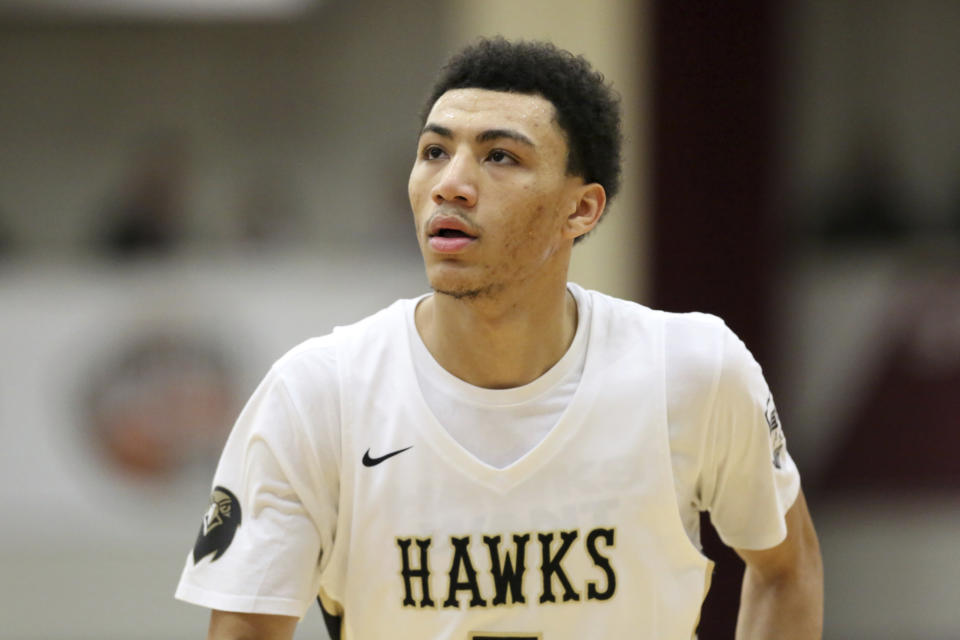Sources: Top prospect with ties to federal basketball corruption probe will commit to Villanova

Jahvon Quinerly, a McDonald’s All-American point guard ensnared in the pending federal basketball corruption case, will commit to play college basketball at Villanova on Wednesday, multiple sources confirmed to Yahoo Sports.
Quinerly is considered one of the country’s best point guards, as he’s the No. 26 overall player and No. 7 point guard in the Rivals.com 2018 rankings. He’s picking Villanova over Oklahoma, which was considered his other strongest suitor.
Quinerly became a household name outside of recruiting circles when he was essentially identified as “Player-5” in the charging documents of one of the three cases tied to the federal basketball investigation. Quinerly initially committed to Arizona, but de-committed this fall after federal documents revealed a payment of at least $15,000 from a financial adviser and business manager to a former Arizona assistant coach. The money was given to the coach so the financial adviser and business manager could eventually work with Quinerly when he turned professional.
Quinerly’s tie to the federal case and, potentially, the NCAA violations it reveals were thoroughly investigated by Villanova, according to sources.
Quinerly hails from northern New Jersey, and his family reached out to the Villanova basketball staff soon after the federal investigation became public in September. Sources said that Villanova did months of due diligence on the case, including hiring an outside law firm to examine the facts of the case. “Based on the information they have and the due diligence that they did, they think he’s got a very good chance to play,” said a source with first-hand knowledge of the recruitment.
Villanova is not allowed to comment on Quinerly, per NCAA rules that would apply to any recruit who hasn’t yet signed a letter of intent. (The school can only acknowledge that it is recruiting him, and can comment after he signs in the period that begins April 11.) His case will be followed closely in college basketball circles, as the players at Louisville (Brian Bowen), Auburn (Austin Wiley and Danjel Purifoy) and USC (De’Anthony Melton) with direct ties to the case have not yet played for their schools this season. (Bowen has since transferred to South Carolina.)
“There’s a chance these guys may never play,” said a high-ranking collegiate official familiar with the cases. “In some respects, the NCAA has to come to grips with what they want to be in these circumstances. Are there certain behaviors that [indicate], you should just move on?”
The federal paperwork shows evidence of multiple conversations about payments tied to Quinerly between Richardson, financial adviser Munish Sood and business manager Christian Dawkins. In July of 2017, a phone call intercepted a discussion of Dawkins and an undercover agent about providing Richardson $15,000 “as pre-payment of his $5,000 monthly ‘fee’ for each of the next three months.” Later that month, Richardson met with Sood in his New Jersey office so that Sood could give Richardson the $15,000. In the meeting, Richardson said that Quinerly’s mother asked for money because “she didn’t know what I was already doing for her son.” Richardson said later that the $15,000 is “going to help with the kids,” which meant steering kids to Sood and Dawkins.
In August, Dawkins is heard saying on wiretap in regards to Quinerly having committed to Arizona a few days earlier: “that deal got done.”
Quinerly declined comment at a USA Basketball event in October when asked if he took money. He said at that point that both he and his family had not heard from federal investigators.
Stu Brown, an independent lawyer with experience in NCAA cases, laid out in a phone interview on Tuesday the process Quinerly will likely go through to attempt to become eligible. Brown, who spoke generically as he’s not affiliated with the case, said the school will do an initial analysis of the situation and eventually make a determination of his initial eligibility. If they find he shouldn’t be eligible, he’d have to go through a student-athlete reinstatement process.
He also said a key determination in this case would be whether the behavior around Quinerly is regarded as “preferential treatment” or an “extra benefit,” which are different definitions in NCAA legalese.
“It should be, in this case, preferential treatment because he’s not enrolled,” Brown said. “The distinction then being because it’s preferential treatment, a key determination will be whether the young man was aware of or involved in any misconduct. Was it just people around the young man without his knowledge?”
Quinerly’s announcement is expected to be released on social media in an understated manner.
Popular college basketball video on Yahoo Sports:

